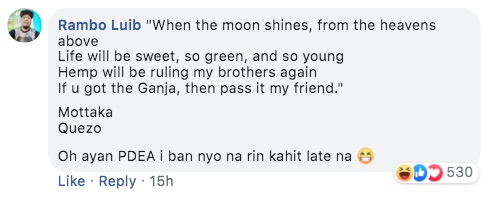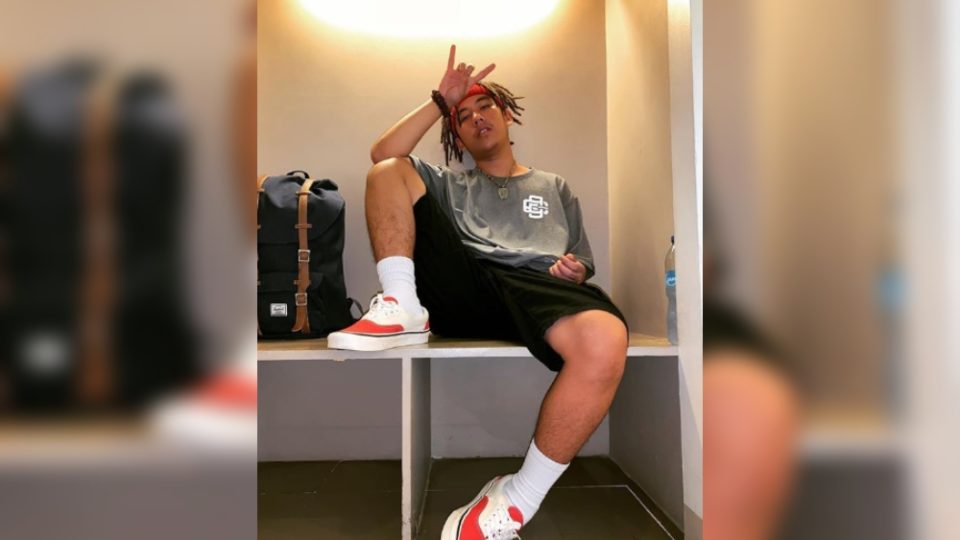The management of teen rapper Shanti Dope called out the Philippine Drug Enforcement Agency (PDEA) yesterday for what they said was its “brazen use of power” in pushing for the banning of the artist’s song Amatz, which the PDEA believes encourages the use of marijuana.
The PDEA announced yesterday that they are urging the Movie and Television Review and Classification Board, the Organisasyon ng Pilipinong Mang-aawit (Organization of Filipino Singers), and broadcasting company ABS-CBN Corporation to prevent the playing of Amatz and its “promotion in the different media stations throughout the country.”
The anti-drug agency focused on several lines, including the lyrics which say, “Lakas ng amats ko, sobrang natural, walang halong kemikal” (My high is so strong, so natural, with no chemicals added).
From PDEA Director General Aaron Aquino’s point of view, these lyrics allegedly talk about the high a person feels when he’s smoking pot.
But Shanti Dope’s team is having none of that.
In a statement posted on the rapper’s Facebook page, they said none of the lines promote the use of marijuana and the narrator actually takes a vocal stance against illegal drugs. What gives the narrator his high is music, they said.
“By the time we reach the song’s chorus, ‘amatz’ already refers to precisely the music through which the persona found his identity — not any form of drugs, but the natural high of creativity and knowing he is the only one who knows [how] to do what he does,” they said.
They said the PDEA cannot interpret a song based on a few lyrics and that they should have tried to understand it by considering its context.
“To take apart a song and judge it based on certain lyrics that offend us is unfair to the songwriter; to presume that our reading of a song is the only valid one is offensive to an audience that might be more mature than we think,” it said.
The management team also called out the PDEA for its decision to police Filipino artists’ creativity, which it said could create a dangerous pattern.
“This ban sets a dangerous precedent for creative and artistic freedom in the country, when a drug enforcement agency can unilaterally decide on what a song is about, and call for its complete ban because it is presumed to go against government’s war on illegal drugs. This is a brazen use of power, and an affront to our right to think, write, create, and talk freely about the state of the nation,” they said.
Below is the music video of the controversial song.
Many netizens who commented on the management team’s statement ridiculed the PDEA.
One netizen named Rambo Luib made fun of the government agency by sharing the lyrics from the rock song Mottaka by Quezo, where the narrator is asking for “ganja” or marijuana. The song was released around 10 years ago.
Luib wrote: “There you go, PDEA. Ban that song even if you’re already late.”

A netizen said it was unnecessary for Shanti Dope’s management team to explain the song. He also accused the PDEA of acting like babies.

A netizen named Kx Louis told PDEA: “You should focus on [closing down] drug labs, [going after] pushers and users, not obsessing over a song. Your high is pretty strong.”

Another netizen mentioned Alapaap, a song of the rock band Eraserheads. In 1995, Senator Vicente Sotto called for the ban of the song, saying that it promotes drug use. The members of the Eraserheads then wrote a letter to Sotto to express their displeasure at his interpretation.

Do you think the PDEA made the right decision or is this an overreaction? Leave a comment below or tweet to @CoconutsManila.





